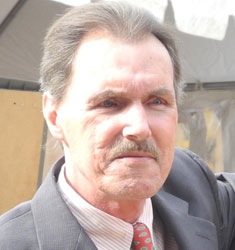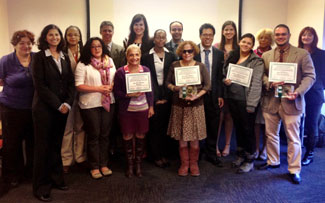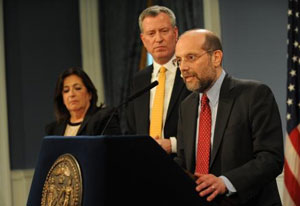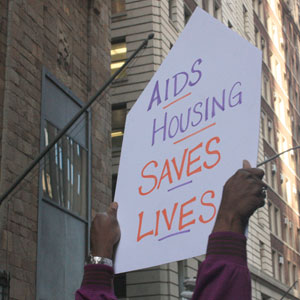RFP Released for Second Phase of Livonia Project in Brooklyn
Apr.15.2014
![]() Last week, HPD released a Request for Proposals for Phase II of the Livonia Avenue Initiative in East New York, Brooklyn. The RFP is for a mixed-use development on four sites in East New York. The document does not specifically mention supportive housing, but Phase I did include 51 units (out of 278 total) for supportive housing through the New York/New York III Agreement.
Last week, HPD released a Request for Proposals for Phase II of the Livonia Avenue Initiative in East New York, Brooklyn. The RFP is for a mixed-use development on four sites in East New York. The document does not specifically mention supportive housing, but Phase I did include 51 units (out of 278 total) for supportive housing through the New York/New York III Agreement.
Proposals must have both mixed-income and affordable housing units. According to the RFP, “Proposals must include a primary financing scenario that does not include competitive financing sources,” like 9% Low Income Housing Tax Credits. The competitive criteria include financial feasibility (defined as providing a range of affordability with the least subsidy), development experience, management and capacity, quality of building and urban design and a retail plan.
The pre-submission conference will be held next week on Wednesday, April 23 at 10:00am at HPD’s offices at 100 Gold Street, Room 1R. The proposal submission deadline is no later than 4:00pm on July 11, 2014.
Diane Sonde, Homeless Outreach Pioneer, Set to Retire
Apr.03.2014

May 1 will mark the retirement of a long time friend and veteran in the fight to end homelessness in NYC. Diane Sonde has been working in the field of social services and mental health, addressing issues of housing and homelessness, for over four decades. Her career started in the 1960s as a caseworker for the NYC Department of Social Services. She will soon be retiring from her position as an Assistant Deputy Commissioner at the NYC Human Resources Administration (HRA)’s Customized Assistance Services.
Perhaps most notably, Ms. Sonde is credited as being one of the first New Yorkers to engage in street outreach for homeless people. On the eve of her retirement, we had the opportunity to talk with Ms. Sonde about her pioneering days doing street outreach and the many lessons she's learned from her decades of service.
Network: You began your career as a caseworker in the 1960s and ’70s. Can you tell us a little about this experience?
Diane Sonde: Working as a Protective Service worker at the Bureau of Child Welfare was an eye-opener. As a child of the sixties, I was idealistic. I wanted to work with families and prevent children from being separated from their parents. I didn't believe placing children in group homes and other types of foster care was a solution. Unfortunately, by observing the unforgettable dysfunction of a few families and the abuse they imposed on children, the likes of which I’d never seen before, it became clear this wasn’t always possible.
Network: What drew you to this line of work in the first place?
DS: There was an ad in the New York City subway system I'd see each day on my way to CCNY [City College of New York] of an elderly lady sitting on a park bench, and it asked if you wanted to help her. Frankly, it was that poster that first drew me to work at the Department of Welfare, my first job in city service.
Continue Reading …Network Testifies Before NYC Council
Apr.02.2014
![]() On March 24, Network staff provided testimony to the New York City Council’s Housing and Buildings Committee on the 2015 preliminary budget. We used our time before the committee to stress the importance of the NYC Department of Housing Preservation and Development (HPD)’s ongoing commitment to supportive housing. We specifically stressed for a successor agreement to New York/New York III in Mayor de Blasio’s forthcoming 200,000-unit housing plan.
On March 24, Network staff provided testimony to the New York City Council’s Housing and Buildings Committee on the 2015 preliminary budget. We used our time before the committee to stress the importance of the NYC Department of Housing Preservation and Development (HPD)’s ongoing commitment to supportive housing. We specifically stressed for a successor agreement to New York/New York III in Mayor de Blasio’s forthcoming 200,000-unit housing plan.
The hearing was led by new Committee Chair and Council Member Jumaane Williams, who was joined by several of his fellow Council members. HPD Commissioner Vicki Been began the hearing with a report on the department’s budget. The Network was pleased to hear Commissioner Been tell the committee that supportive housing would indeed be part of the soon-to-be released housing plan.
You can read our testimony here.
The Network also testified on March 26 on the topic of a new rental subsidy program for homeless people in New York City. The Council’s Committee on General Welfare held the hearing to elicit feedback on their Resolution 123-A, which called on the Gov. Cuomo and the NYS Legislature to remove longstanding language in the budget that bars New York City from using State reimbursements for rental subsidy programs for homeless people. The Resolution also called on New York City and State to work together to create that rental subsidy program.
Continue Reading …RIP Steven Warren, Homeless Advocate
Apr.01.2014
 The Network was deeply saddened last month by the death of Steven B. Warren, a longtime member of the New York supportive housing community. Mr. Warren was the former Executive Director of Services for the UnderServed (SUS) and Chairman of the Board of Directors at Praxis Housing Initiatives. He passed away on March 21.
The Network was deeply saddened last month by the death of Steven B. Warren, a longtime member of the New York supportive housing community. Mr. Warren was the former Executive Director of Services for the UnderServed (SUS) and Chairman of the Board of Directors at Praxis Housing Initiatives. He passed away on March 21.
“Steve’s story is one of courage, conviction and accomplishment,” said Svein Jorgensen, Chief Executive Officer of Praxis Housing Initiatives. “He was a visionary and a giant in the nonprofit field. His work impacted the lives of thousands of homeless and disabled New Yorkers.”
Mr. Warren began his time in the New York human services sector in the 1980s as a program planner for Project Return (now Palladia). He then moved on to serve as Executive Director of SUS, a prominent Network member, in 1987. It was during his tenure that SUS opened The Knickerbocker, one of the first supportive housing residences in the nation for veterans. SUS has since become one of the premier housing and services providers for veterans in New York City.
Mr. Warren himself was a veteran of the Vietnam War, and it was this experience that moved him to open the Knickerbocker.
Continue Reading …News Media Highlights Sister Tesa, Hour Children
Mar.14.2014
 Just in time for St. Patrick’s Day, two stories were published this week on Sister Tesa Fitzgerald, the celebrated Irish American and executive director of a Queens-based supportive housing provider.
Just in time for St. Patrick’s Day, two stories were published this week on Sister Tesa Fitzgerald, the celebrated Irish American and executive director of a Queens-based supportive housing provider.
The pieces, which ran in the Wall Street Journal and Irish Central, highlight the recent opening of Hour Apartment House II, a supportive housing residence that opened late last year. The residence offers housing and services to formerly incarcerated women and their children.
The Wall Street Journal piece highlights the warm, inviting atmosphere created by Hour Children, the nonprofit that developed the residence. “I never thought I would live somewhere so beautiful,” says one of the tenants. “When you out there on the street, you don't think someone like Sister Tesa could love a total stranger. I'm glad she loves me,” says another. It’s a moving account of how supportive housing can transform the lives of some of New York’s most underserved individuals and families (please note that this article may be behind a pay wall).
Continue Reading …Guest Blog: A Tenant Advocate Discusses His Day in Albany
Mar.10.2014
 When Robert Hart awoke on February 11, he had no idea he’d be visiting Albany that day to tell his story to New York’s senators and representatives.
When Robert Hart awoke on February 11, he had no idea he’d be visiting Albany that day to tell his story to New York’s senators and representatives.
Robert is a tenant at The Castle, a transitional housing residence operated by the Fortune Society. Last month, Robert joined the Network, Homeless Services United and others for a trip to Albany to advocate for supportive housing programs. Other tenants and staffers from Fortune Society were scheduled to attend our advocacy day, and on a whim Robert asked if he could join. Everyone said of course.
Robert made quite the impression on those around him – everyone from our staff to the elected officials he met in meetings. He spoke of his experiences in housing and the services offered by Fortune to help him improve his reading and writing. He also read several poems he’d written, moving all those around him. As the Network gears up for its next big Albany advocacy day on Tuesday, March 18, we present a few words from Robert on his experiences in Albany. We encourage all of our members to reach out to their tenants to see if they’d like to attend our advocacy day on March 18. We’d love to have them join us. Robert, for his part, plans to attend again.
"My Trip to Albany," by Robert Hart:
It was a sudden and unexpected trip, but it was an experience of a lifetime.
What started as a joke question – “Can I go?” – quickly became a reality. There I was on a three-hour trip to Albany, not knowing what to expect. I had an immediate flashback to my trip to Washington when I was in junior high school. After the trip, I and my class had to write an essay about our experience in Washington. Because of my poor reading and writing at the time, my essay was never completed. That’s why this is a joy, to be asked to write a few lines about my trip to Albany. I finally have a sense of completion of my junior high essay.
As I walked into the building, I was in awe of how huge the building was. The first thing that got my attention was the beautiful statues and paintings in the building. It seemed as time quickly passed, I felt as if I became a part of the staff. At 6’5”, I felt that day so much bigger. Not like Robert Hart, the client at Fortune, but more like Mr. Robert Hart, team member and staff. I wanted so much to be a part of what was taking place that day in Albany.
I knew there was something I could say, about how Fortune has been a great asset to my life and others and how Fortune is a great organization to keep up and running, so I got up and took the floor.
Because of my inability to read and write through high school and my young adult years, I take special pride in the poems I put together. I learned creative writing from Fortune. They enhanced my writing skills.
Thanks to everyone who enjoyed my poems, there will be more to follow.
To read two of Robert’s poems, see here and here. For a rundown of our chief advocacy goals this month, see this story.
Free Program Helps Supportive Housing Residences Go Smoke-Free
Mar.04.2014
 The NYC Department of Health and Mental Hygiene (DOHMH) has partnered with the Network and the NYC Coalition for a Smoke-Free City to offer a free program to help supportive housing residences go smoke-free.
The NYC Department of Health and Mental Hygiene (DOHMH) has partnered with the Network and the NYC Coalition for a Smoke-Free City to offer a free program to help supportive housing residences go smoke-free.
Supportive Housing Goes Smoke-Free will offer technical assistance for supportive housing providers interested in going smoke-free at one or more of their residences. The Network joined DOHMH and other partners last year to award residences that went through a similar program.
In this latest round, training and technical assistance topics will include two major subjects: 1) Effective smoke-free policies, gaining staff buy-in, resident education, compliance and adherence and 2) One-on-one technical assistance and on-site meetings with staff and/or residents.
The program is free of charge for up to 12 selected organizations that agree to explore smoke-free policies.
To apply for this opportunity, you must complete and submit this short application no later than 5:00pm on Monday, March 31st. You must also select at least one building, either owned or managed by your organization, in which to explore going smoke-free. DOHMH will select buildings based on readiness, demonstrated by organizational buy-in and capacity for resident engagement. Priority will be given to programs with a demonstrated capacity to provide support for tenants who wish to quit smoking.
Continue Reading …Steven Banks to Lead NYC Human Resources Administration
Mar.04.2014
 New York City Mayor Bill de Blasio has announced the final social service agency appointment of his administration.
New York City Mayor Bill de Blasio has announced the final social service agency appointment of his administration.
On February 28, the mayor named Steven Banks the new Commissioner of the Human Resources Administration (HRA). One of the city’s most prominent public interest lawyers, Mr. Banks has served as Attorney-in-Chief at the Legal Aid Society since 2004 and has been with the organization since 1981.
“I always dreamed that Steve would work inside government,” says Laura Jervis, Executive Director of the West Side Federation for Senior and Supportive Housing. “His values, his passion for justice, his understanding of the plight of under-resourced New Yorkers combined with his fine legal mind will advance the transformation of our City into a place where equity is enjoyed by all. Who knew that dreams really can come true?”
Mr. Banks managed a staff of 1,900 at Legal Aid and was responsible for all aspects of the organization’s criminal, juvenile rights and civil programs. He is credited with helping reach a landmark settlement with the city in 2008 over its treatment of the homeless, which resulted in the establishment of a permanent enforceable right to shelter for homeless families in New York City.
Continue Reading …Network Releases Report on NY/NY III Agreement
Feb.27.2014
 The Network has released a new report on the New York/New York III Supportive Housing Agreement, the landmark 2005 commitment to create 9,000 new units of supportive housing in 10 years.
The Network has released a new report on the New York/New York III Supportive Housing Agreement, the landmark 2005 commitment to create 9,000 new units of supportive housing in 10 years.
The report, available here, synthesizes findings from interviews with more than 140 members of the supportive housing community. Taking Stock of the New York/New York III Supportive Housing Agreement: A Community View of the Achievements and Challenges of Implementing the Nation's Largest Supportive Housing Initiative offers an in-depth look at the initiative and explores key areas for growth and improvement for the next great partnership between New York City and State to end homelessness.
"Taking Stock confirms what many of us have known for years: That the New York/New York III Agreement has been a phenomenal engine to house formerly homeless New Yorkers," says Network Executive Director Ted Houghton. "We hope this report will serve as an aid to the supportive housing community, our government partners and other stakeholders as we seek to build upon NY/NY III with a successor agreement. After more than 30 interviews and seven focus groups, we're confident in calling NY/NY III a resounding public policy success."
The Network interviewed an array of stakeholders for this project, including representatives from all 10 of the government signatories of the agreement, supportive housing and shelter providers, NY/NY III tenants, advocates and private sector partners. The goal of the project was to provide a platform for this diverse group of stakeholders to offer feedback on the successes and challenges of the initiative and to elicit their guidance on how best to design future supportive housing agreements.
Continue Reading …HIV/AIDS Rent Cap Proposed in City, State Budgets
Feb.24.2014
 Advocates from the HIV/AIDS and supportive housing communities are celebrating a long-awaited policy victory in New York City.
Advocates from the HIV/AIDS and supportive housing communities are celebrating a long-awaited policy victory in New York City.
Last week, Gov Andrew Cuomo released his 30-day amendments for the 2014-2015 fiscal year budget. The amendments include new language to fix a rental assistance program for people living with HIV/AIDS in New York City. The governor proposes to place a cap on the amount of money these individuals must pay in rent. Under the amendment, tenants with HIV/AIDS can be charged no more than 30% of their annual income in rent.
This rent cap – advocated for years by our friends at VOCAL, Housing Works and other allies – represents a major victory for low-income and formerly homeless individuals living with HIV/AIDS in NYC. NYC is home to 12,000 individuals with HIV/AIDS, many of whom pay up to 70 percent of their disability income toward rent.
The 30-day amendment comes on the heels of NYC Mayor Bill de Blasio’s budget proposal earlier this month, which also included a 30% rent cap for HIV/AIDS tenants. New York City will pay for roughly $17 million, or 70 percent of the costs associated with this partnership; New York State will pay for the remaining 30 percent, or $9 million.
This policy fix will help prevent thousands of low-income New Yorkers from becoming homeless. We congratulate Housing Works, VOCAL and all our partners who’ve been on the front lines of this issue for years, and we applaud Mayor de Blasio and Gov. Cuomo for their action!
For a press release on all the governor’s 30-day amendments, see here.
